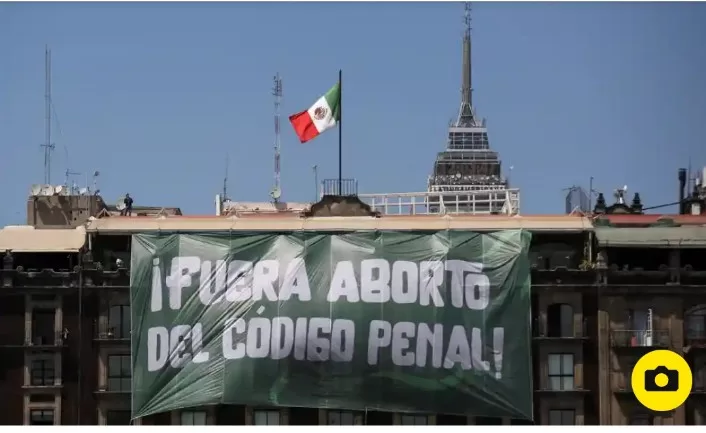In a landmark unanimous decision, Mexico’s supreme court has declared state laws prohibiting abortion as unconstitutional and a violation of women’s fundamental rights, marking another significant triumph for reproductive rights advocates across Latin America.
This groundbreaking ruling comes two years after the court’s directive to the northern state of Coahuila to strike down abortion sanctions from its criminal code, sparking an intricate state-by-state legal battle. To date, 12 out of Mexico’s 31 states have taken steps to decriminalize the procedure.
The court’s verdict represents a resounding victory for the Grupo de Información en Reproducción Elegida (GIRE), a reproductive rights organization headquartered in Mexico City. They initiated this pivotal legal challenge as part of a sustained, years-long campaign for reform.
Mexican women have taken to social media platforms to express their jubilation, adorning their posts with green heart emojis, emblematic of the flourishing feminist movement in Latin America.
Andrea Hernández, a prominent feminist activist in Mexico City, ecstatically commented, “It feels like a dream. Like I’m the happiest person alive right now. If you don’t have the ability to give birth, you can’t tell me whether you think it’s right or wrong.”
Nonetheless, it’s essential to note that this ruling doesn’t immediately translate into nationwide decriminalization. Mexico’s two congressional chambers must now collaborate to pass accompanying legislation, effectively erasing abortion from the country’s penal code.
The timeframe for this legislative process remains uncertain; it may progress swiftly or extend over several years, analogous to the court’s ruling on marijuana decriminalization in 2018, which only received official congressional approval in 2021, leaving the possession and recreational use of the substance in a legal gray area for three years.
Nonetheless, Wednesday’s verdict will ensure legal protection for both women seeking abortions and healthcare professionals engaged in providing abortion services, shielding them from criminal charges. Additionally, individuals with uteruses should now have access to abortion services in federal healthcare facilities nationwide.
GIRE asserted, “No woman or pregnant person, nor any health worker, will be punished for abortion.”
This ruling represents the latest in a series of victories for women’s rights activists in Latin America, a region where the Catholic Church wields considerable influence, resulting in restrictions or outright bans on abortion in numerous countries.
Countries such as Nicaragua, Honduras, El Salvador, the Dominican Republic, Haiti, and Suriname maintain complete bans on abortion. Nevertheless, persistent organizing efforts have led to significant strides for pro-choice activists. Argentina legalized abortion in 2020, and even the highly conservative Colombia followed suit two years later.
Moreover, this Mexican ruling underscores a growing divergence between Mexico and its northern neighbor, the United States. The U.S. Supreme Court voted last year to allow specific states to prohibit abortion, subjecting both women seeking to terminate pregnancies and medical professionals providing abortion services to criminalization, even if the fetus is not viable.
In response, fifteen American states swiftly enacted laws banning abortions as early as six weeks of gestation, often before many women even realize they are pregnant. Texas, in particular, has gone to the extent of offering cash rewards to individuals who report their neighbors for seeking an abortion.
The U.S. ruling from last year has led to the emergence of a network of individuals, known as “Janes,” who procure abortion pills over the counter in Mexico and dispatch them to women and girls in need in the United States. It has also sparked a surge in abortion tourism, with women traveling to other U.S. states where abortion remains legal and to Mexico. Wednesday’s ruling may attract more women from the American South seeking healthcare in Mexico.
Importantly, this court decision signifies a crucial milestone for Mexican feminists who continue to protest against the country’s alarming rates of femicide, sexual assault, and domestic violence.
Gina Jimenez, a researcher at Data Cívica, an organization that compiles data on violence against women in Mexico, commented, “We’ve seen rates of femicide rise since 2006 and even more since 2014 – and that’s just one of the many difficult things Mexican women continue to face.”
Every year on International Women’s Day, women’s rights groups hold a massive march in Mexico City, attracting tens of thousands dressed in purple and green. Last year, several women displayed a banner demanding legal access to abortion from the government.
GIRE expressed confidence in the Mexican Congress, stating, “We’re confident congress, whose legislation still provides obstacles to reproductive autonomy, will take account of the critiques of the highest court in the land and will guarantee once and for all the right to choose.”






